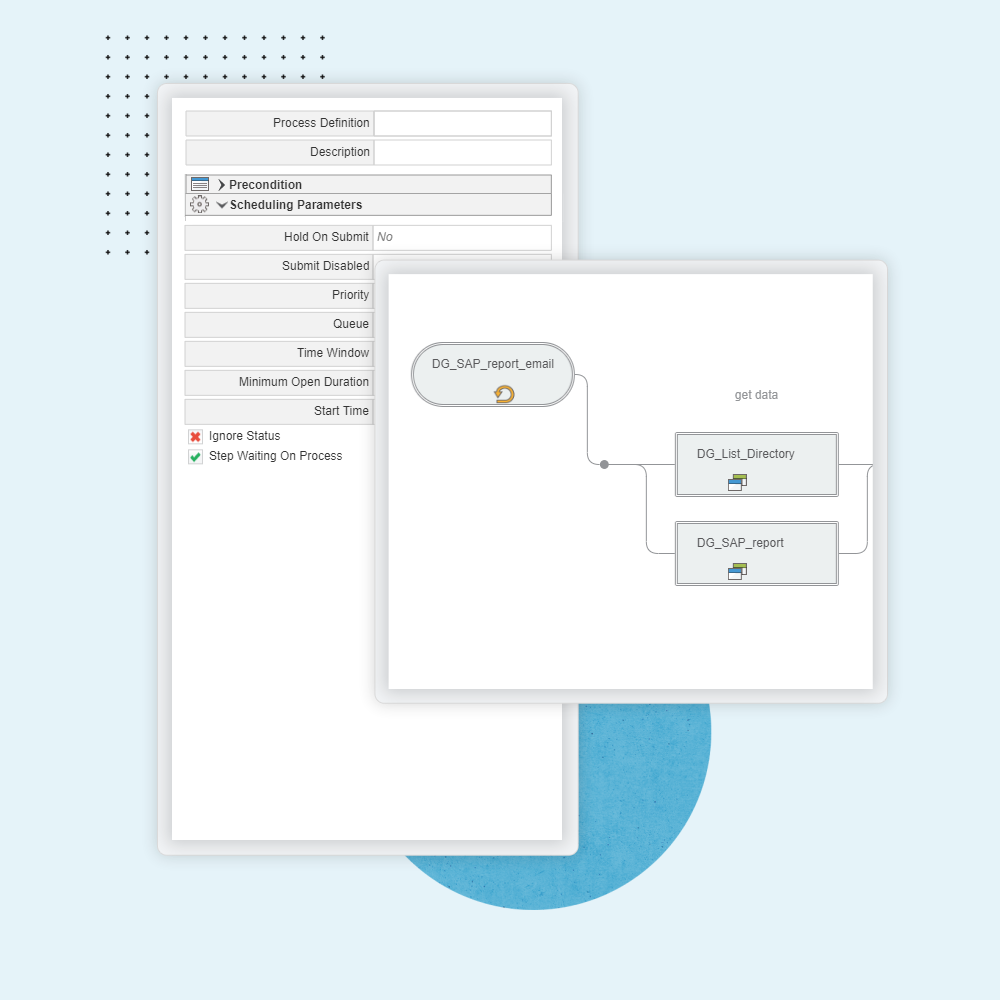ETL Automation Tool Designed For Hybrid IT
Integrate disparate data sources and improve data quality with a modern, cloud-native ETL tool.

Simplify Your Cloud Data Warehouse
-
Low-Code Data Integration
-
Accelerate Digital Transformation
-
Cloud-Native Data Management
-
Data Security Made Simple

Low-Code Data Integration
Seamlessly coordinate and integrate on-premises data flows, OS activity, API adapters and cloud service providers (AWS, Azure, VMware, Google Cloud). Automate repetitive tasks with Redwood’s no-code connectors, sequences, calendars and more.
- Execute workflows in real-time based on detected source files, data, events, messages from apps and more
- Ensure data timeliness and availability with powerful exception handling, auto-remediation and access control
- Build custom workflows and consumable automation services/microservices with native SOA APIs and formats
- Centralized control over cloud computing, resource provisioning and data across ERP, CRM, finance, ETL and more

Accelerate Digital Transformation
Add as many servers, applications and environments as you need without worrying about extra pricing or budget restrictions. RunMyJobs by Redwood is designed to expand as DevOps adapts to new business requirements.
- IT Operations: Automate IT processes across on-premises and multi-cloud environments, OS activity and web API interactions
- Managed File Transfers: Move, copy and manage millions of files per month across Amazon S3, Azure Storage, Google Cloud Storage and more
- Data Warehousing: Coordinate resource management applications in hybrid environments, automate virtualization and run common ETL testing and database tasks
- Business Processes: Orchestrate data workflows, real-time dashboards, big data (Hadoop), business intelligence (BI tools) and more with an intuitive, drag-and-drop interface
90% of our complete integration frameworks are based on Redwood – it’s crucial to our environment and how we work. Redwood makes it much more efficient for us to support our ever-growing customer base. We could not manually deliver all our data between our applications and send out reports within the same day without automation.
Ruben De Vries, Engineer, Robeco

Cloud-Native Data Management
Redwood offers the only workload management software built for SaaS scalability and hybrid cloud environments. Eliminate the hassle of hosting, deploying and maintaining your multi-cloud management solution.
- Single-tenant cloud architecture with zero-effort maintenance and guaranteed 99.95% uptime
- Easily set flexible load balancing and process priorities across applications to extract data without bottlenecks and downtime
- Configure virtual servers and run scripts with lightweight, self-updating agents for Windows, Linux, AIX, HPUX, macOS, OpenVMS and Solaris
- Real-time metric overviews and dashboards with alerts and SLA notifications that enable teams to resolve issues before they impact performance

Data Security Made Simple
- Access SAP, Oracle, AS/400, VMS and other applications and web services directly through TLS 1.3 encrypted, agentless connections
- Use built-in authentication or SSO/SAML 2.0+ integration such as Okta, Ping Identity, PingFederate, or Microsoft Azure AD
- Establish a comprehensive audit trail for all process and user activity and enforce business rules across the enterprise
- Rely on Redwood’s ISO 27001, SOC 2 and CSA STAR Level 1 certifications, best-in-class SaaS security policies and regular penetration tests
Have Confidence In Your Data Transformations
Frequently Asked Questions
What is ETL?
ETL (Extract, Transform, Load) is a part of the data testing process and is used to move and transform data between different data stores, such as databases, data warehouses, and data lakes.
In an ETL process, data is first extracted from one or more source data stores, such as operational databases, flat files, or APIs.
The extracted data is then transformed into a format that is suitable for the target data store, such as by filtering, aggregating, or joining the data.
Finally, the transformed data is loaded into the target data store, such as a data warehouse or data lake, where it can be used for analytical or reporting purposes.
Data validation is an important step within the transform phase of ETL, where the data is checked to ensure that it conforms to specific rules or quality of the transformed data.
ETL is heavily dependent on the quality and integrity of the source data, and requires careful handling and preparation to ensure the success of the transformation and loading processes. Learn more about Redwood’s data automation software and testing solution.
What is ETL automation?
ETL automation refers to the methods and tools used to extract, transform and load data without human intervention. ETL automation has grown in importance as data processes become more complex and businesses become more dependent on disparate data sets. Cloud-native workload automation solutions such as RunMyJobs by Redwood offer low-code ETL automation and data orchestration. Automate your entire data pipeline with Redwood.
What can be used to automate ETL?
Traditionally, IT teams have relied on scripts to automate ETL (Extract, Transform, Load) processes. Scripts are time-consuming, error-prone and resistant to change, leading many IT shops to implement automation solutions that enable low-code development. Automation platforms such as RunMyJobs support many types of data automation, including ETL testing automation, enabling users to orchestrate cross-platform processes. See what you can achieve with Redwood’s ETL testing tool.
Does Redwood support ETL automation?
Yes, Redwood's automation platform provides key features and capabilities that enable users to orchestrate data processes across heterogeneous environments, including on-premises, private cloud and public cloud infrastructure. This makes it possible to build end-to-end ETL processes that deliver real-time data across the enterprise. See what else you can achieve with Redwood’s workload automation software.
